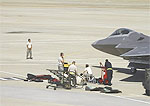Dorr: Grounding combat squadrons is not the answer for sequestration
 When the Air Force grounded 17 combat squadrons in response to the harsh budget mandate known as the sequester, was it expecting an outcry that never came?
When the Air Force grounded 17 combat squadrons in response to the harsh budget mandate known as the sequester, was it expecting an outcry that never came?
Did someone on the Air Staff think public outrage would force Congress to act?
That’s exactly what happened when the Federal Aviation Administration reacted to the sequester by threatening to shutter control towers at 149 airports — something it never really intended to do. Public anger and Capitol Hill action saved the towers and kept FAA employees at work.
If the Air Force thought the same thing would happen when it idled airmen and airplanes, it was wrong. The service announced April 9 it would ground 13 squadrons immediately and four more in the near future.
The public didn’t notice.
But airmen did. The action is a blow to the very purpose of the Air Force — and to morale.
To cite just one lesson from history: In every air-to-air campaign ever fought, the outcome was determined not by the aircraft but by the pilot. In the Korean War, the American F-86 Sabre and the Soviet MiG-15 were similar. Sabre pilots racked up a 7-to-1 kill ratio over the MiG because our pilots were better trained and spent more time in the combat theater.
When you idle pilots, crew members and maintainers, it’s not a process that can be reversed later without difficulty.
“The standdown will have a significant impact on [my] wing’s overall operational readiness and ability to support contingencies around the world,” said Col. Jeannie Leavitt, commander of the 4th Fighter Wing at Seymour Johnson Air Force Base, N.C., in a statement. “Combat skills and proficiency are perishable and take time to be regained. Fighter aviation is a highly demanding endeavor and there is no room for error.” The 336th Fighter Squadron in Leavitt’s wing is one of those that has stopped flying.
The situation is “not good,” Lt. Gen. Burton Field, the Air Staff’s deputy chief of staff for operations, plans and requirements, told a Capitol Hill subcommittee April 24. “In 45 to 60 days, those aircrew and pilots, and navigators and maintainers will be out of currency. That’s going to be a significant recovery problem.” Field said he doesn’t know how the Air Force will recover from the grounding if it lasts six months “because we haven’t done that before.”
In separate testimony, Air Force Secretary Michael Donley said, in effect, the problem is above his paygrade but “our national leaders” need to resolve it.
We can survive idling a part of the force once, briefly, but this practice isn’t something we do on a regular basis — and a new budget crisis will hit us Oct. 1.
Congress must return to the passing a traditional budget each year while Air Force leaders must find other ways to save money.